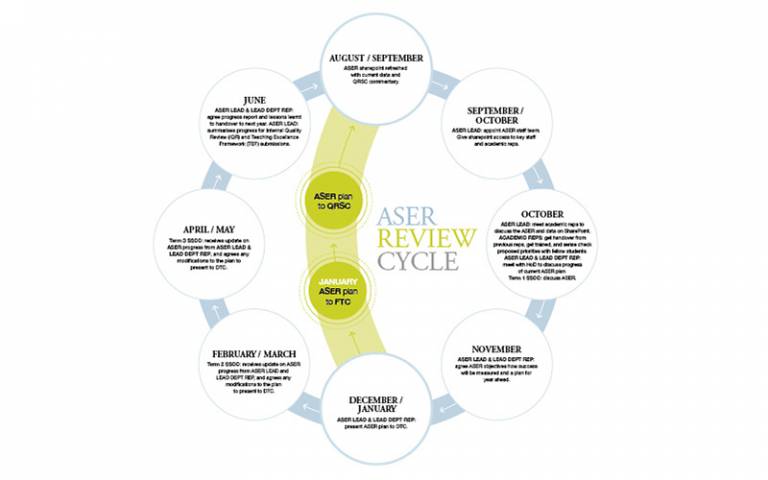Changes have been made to the Annual Student Experience Review (ASER) to build on quality assurance and quality enhancement across taught programmes at UCL.
The Annual Student Experience Review (ASER) is carried out by UCL academic departments to produce:
- a yearly health check
- an improvement plan for all taught programmes.
It draws on education quality monitoring and enhancement activities, including data review, External Examiner Reports, student survey results, NSS Action Planning and Staff Student Consultative Committees.
ASER plays a role in:
- quality assurance, ensuring that departments are identifying and acting on information about the quality of their programme and recording that centrally
- quality enhancement, supporting continuous quality improvement driven by what matters to students.
The annual ASER cycle (PDF infographic)
View all the key actions throughout the year in the below infographic. Click on the image to open the full PDF version or view the ASER review cycle.
Accessible word document version.
What’s changed for 2019-20
- To make sure it is an on-going process, the Development and Enhancement Plan for each department will be a “live” document on SharePoint, updated throughout the year as developments are completed and new developments identified.
- Departments will complete a single ASER Development and Enhancement Plan covering both undergraduate (UG) and postgraduate taught (PGT) activity.
- Students will be involved at an earlier stage in the review and enhancement process, providing an opportunity for working in partnership, for example in developing a departmental UCL ChangeMakers project.
- The Quality Review Sub-Committee (QRSC) will receive, scrutinise and approve ASER Development and Enhancement plans from each academic department (or equivalents).
The team leading each ASER
- lead student academic representatives at undergraduate and taught postgraduate levels (student rep)
- department ASER lead (a member of staff)
- Arena faculty liaison (an education expert from the Arena Centre for Research-based Education). Their role is to help the department and student lead identify appropriate actions, support them to achieve those actions, help to secure central support on matters such as digital education or careers or participation in strategic projects.
How actions are identified
Analysis of data guides student reps and ASER leads, who work in partnership to agree actions and targets.
Data sources include:
- student evaluation questionnaires (SEQs)
- National Student Survey (NSS)
- Postgraduate Taught Experience Survey (PTES)
- external reports (such as external examiner reports and IQR)
- Staff Student Consultative Committees (SSCC) and Department Teaching Committee (DTC)
- other (e.g Town hall meetings, Unitu etc).
How progress is monitored
Progress is monitored in SSCC and DTC and can be added to or updated at other times (for example, when new data arrives or key issues arise or progress milestones reached).
How ASER is submitted to QRSC
A snapshot of the document is taken at the end of February (after it has been agreed in DTC and FTC).
The QRSC will be charged with approving them and with checking with Faculties that all actions have been appropriately followed up.
- 2.3 The Role of the Quality Review Sub-Committee: more on the role of the QRSC in the Academic Manual.
Key dates
31 October 2019 Department ASER and data (e.g. NSS and PTES) made available to the Faculty on SharePoint. Each Department ASER has been pre-populated with actions from the 2018/19 ASER development and enhancement plans.
January 2020 Further data available to Departments.
24 February 2020 Snapshot from SharePoint of completed ASERs (approved by the relevant DTC and FTC prior to this date).
- Section 2: Annual Student Experience Review (ASER) in the Academic Manual: find out how ASER fits into UCL’s Quality Review Framework.
 Close
Close


